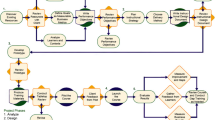Abstract
Business school faculty have begun to increase ethics instruction, but very little has been done to assess the effectiveness of this instruction. Curricula-wide studies present conflicting results of the effect of ethics integration into the business curricula. Several studies suggest that courses like business ethics and business and society might have an effect on the ethical awareness or ethical reasoning of business students. A belief of many individuals interested in business ethics is that students must be exposed to ethical awareness and ethical reasoning in business ethics and business and society-type courses and this should be supplemented by discussions of these topics in various business courses such as Accounting, Finance, Marketing, and others.
This study reports the results of integrating a unit of business ethics into eleven accounting classes at two universities. An approach for measuring the effect of ethics integration into accounting and other business courses is suggested, and an assessment is made of the impact of ethics integration on students in accounting classes. Results indicate that the principles on which students rely when making moral decisions were affected by ethics integration. After ethics integration, students relied more heavily on “the disclosure rule”, “the golden rule”, and the “professional ethic.”
Similar content being viewed by others
References
American Assembly of Collegiate Schools of Business: 1988,Accreditation Council Policies, Procedures and Standards (AACSB, St Louis).
American Institute of Certified Public Accountants: 1988,Education Requirements for Entry into the Accounting Profession (AICPA, New York).
Arens, A. A. and Loebbecke, J. K.: 1988,Auditing, An Integrated Approach (Prentice Hall, Englewood Cliffs, NJ).
Arlow, P. and Ulrich, T. A.: 1983, ‘Can Ethics Be Taught to Business Students’,The Collegiate Forum 14 (Spring), p. 17.
Armstrong, M. B.: 1987, ‘Moral Development and Accounting Education’,Journal of Accounting Education 5 (Spring), pp. 27–34.
Bok, D. C.: 1976, ‘Can Ethics be Taught?’,Change October, pp. 26–30.
Boyd, D. P.: 1981–1982, ‘Improving Ethical Awareness Through the Business and Society Course’,Business and Society 20-1 and21-1, pp. 27–31.
Callahan, D.: 1980, ‘Goals in the Teaching of Ethics’, in D. Callahan and S. Bok, Eds.,Ethics Teaching in Higher Education (Plenum Press, New York), pp. 61–80.
Campbell, D. J. and Stanley, J. C.: 1966,Experimental and Quasi-Experimental Designs for Research (Houghton Mifflin Company, Boston).
Cooke, R. A.: 1988,Ethics in Business: A Perspective (Arthur Andersen & Co. Center for Professional Education, St. Charles, IL).
Cohen, J. R. and Pant, L. W.: 1989, ‘Accounting Educators’ Perceptions of Ethics in the Curriculum’,Issues in Accounting Education 4 (Spring), pp. 70–81.
Kohlberg, L.: 1981,The Philosophy of Moral Development (Harper & Row Publishers, San Francisco).
Lane, M. S., Schaupp, D., and Parsons, B.: 1988, ‘Pygmalion Effect: An Issue for Business Education and Ethics’,Journal of Business Ethics 7 (July), pp. 223–229.
Langenderfer, H. Q. and Rockness, J. W.: 1989, ‘Integrating Ethics into the Accounting Curriculum: Issues, Problems, and Solutions’,Issues in Accounting Education 7 (Spring), pp. 58–69.
Lewis, P. V.: 1989, ‘Ethical Principles for Decision Makers: A Longitudinal Study’,Journal of Business Ethics 8 (April), pp. 271–276.
Loeb, S. E.: 1988, ‘Teaching Students Accounting Ethics: Some Crucial Issues’,Issues in Accounting Education 3 (Fall), pp. 316–329.
Martin, T. R.: 1981–1982, ‘Do Courses in Ethics Improve the Ethical Judgment of Students?’,Business and Society 20(2) and21(1), pp. 17–26.
National Commission on Fraudulent Financial Reporting (The Treadway Commission): 1987,Report of the National Commission on Fraudulent Financial Reporting.
Ponemon, L. and Glazer A.: 1990, ‘Accounting Education and Ethical Development: The Influence of Liberal Learning on Students and Alumni Accounting Practice’,Issues in Accounting Education 5(2), pp. 195–208.
Rayburn, L. G.: 1989,Principles of Cost Accounting (Irwin Publishing Co, Homewood, IL).
Stead, B. A. and Miller, J. J.: 1988, ‘Can Social Awareness Be Increased Through Business School Curricula?’Journal of Business Ethics 7, pp. 553–560.
Weber, J.: 1990, ‘Teaching Ethics to Future Managers’,Journal of Business Ethics 9, pp. 183–190.
Author information
Authors and Affiliations
Additional information
Kenneth M. Hiltebeitel, Ph.D., CPA is an Associate Professor of Accountancy at Villanova University. He has included a unit on business ethics in his Auditing and Advanced Accounting classes for the past two years.
Scott K. Jones, Ph.D. is an Assistant Professor of Accounting at the University of Delaware. He has included a unit on business ethics in his Cost Accounting classes for the past two years.
Rights and permissions
About this article
Cite this article
Hiltebeitel, K.M., Jones, S.K. An assessment of ethics instruction in accounting education. J Bus Ethics 11, 37–46 (1992). https://doi.org/10.1007/BF00871990
Issue Date:
DOI: https://doi.org/10.1007/BF00871990




